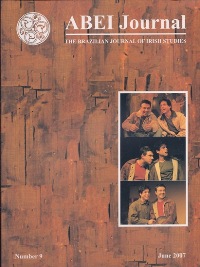“We Had the Experience But Missed The Meaning”: On The Relevance of Lacanian Categories in the Analysis of Fiction
DOI:
https://doi.org/10.37389/abei.v9i0.3688Palavras-chave:
John Banville, Seamus Deane, Jacques Lacan, Novels.Resumo
After having shown the three paradoxes of literature (the master being mastered by his literary tools, the reader’s identification versus her critical stance, the text combining thematic unity and vital inconsistencies) we look at how several Lacanian concepts have their impact on a narrator’s style: the twofold psychic system, three phases that mould our perception, the function of the father figure, the notion of the Other, the others and the “objects o”. It is in the relationship to the object o, where the two different energies of our psychic system meet, that we find out which type of person we are: neurotic, psychotic
or perverse. As it is mainly the hysteric neurotic and the paranoiac psychotic type who figure most often as narrators in literature, we look at how the former type is realized in Banville’s The Book of Evidence and in Deane’s Reading in the Dark while the latter, the psychotic type, permeates the narrative of Banville’s Mefisto. Indeed, the protagonist’s pathological narcissism which steers him now into megalomania, now into a death wish (unification with the Other he lost at birth), make him
utterly confuse inner and outer worlds, literal and metaphorical meanings.
Referências
Banville, John. The Book of Evidence. London: Minerva, 1989.
____. Mefisto. London: Minerva, 1993.
Bromberg, Philip M. “The Mirror and the Mask: On Narcissism and Psychoanalytic Growth.” Essential Papers on Narcissism. Ed. Andrew P. Morrison. New York and London: NY UP, 1986, 438–466.
Deane, Seamus. Reading in the Dark. London: Jonathan Cape, 1996.
____. Rumours: In memorian Frank Deane (1905-75). Dublin: The Dolmen Press, 1977.
T. S. Eliot “The Love Song of Alfred Prufrock” in M.H. Abrams and St. Greenblatt, eds. The Norton Anthology of English Literature II, 2365. New York/London: Norton, 2000.
____. The Dry Salvages II, in Four Quartets, vertaald, ingeleid en gecommentarieerd door Herman Servotte. Antwerpen/A’dam: De nederlandsche Boekhandel, 1974.
Fink, Bruce. A Clinical Introduction to Lacanian Psychoanalysis. Theory and Technique. Cambridge/London: Harvard University Press, 1997.
Herron, Tom. “ContamiNation: Patrick McCabe and Colm Toibin’s Pathographies of the Republic.” Contemporary Irish Fiction: Themes, Tropes, Theories. Ed. Liam Harte and Michael Parker. London: Macmillan, 2000: 168-191.
Kampen, Gerd. Zwischen Welt und Text. Narratologische Studien zum irischen Gegenwartsroman am Beispiel von John McGahern und John Banville. Schriftenreihe Literaturwissenschaft, Bd. 56, hg. Heinz Kosok, Heinz Rölleke. Trier: Wissenschaftlicher Verlag Trier, 2002.
Lacan, Jacques. Les Psychoses, Le Séminaire Livre III. Les Psychoses. Paris: Seuil, 1981, 65.
Libbrecht, Katrien and Van de Vijver, Gertrudis. “Het Ding versus het object a. Naar aanleiding van Baas’ pleidooi voor een ‘Kritiek van het zuiver verlangen’”. Psychoanalytische perspectieven 25 (1994), 61.
Schwall, Hedwig. “Fatal Fathers and Sons in Tom Murphy’s A Whistle in the Dark.” Interrelations. A Special Issue of the ABEI Journal, the Brazilian Journal of Irish Studies; June 2003. Nr 5, University of Sao Paulo. 219-239, especially 221-3.
Yeats, W. B. Autobiographies. London: Macmillan, 1981.
Zizek, Slavoj. Looking awry: an introduction to Jacques Lacan through popular culture. Cambridge: MIT Press, 1991.


